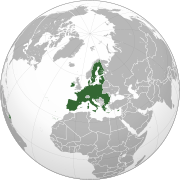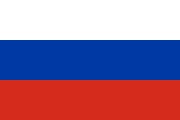India as a rising superpower
| Federative Republic of Brazil | |||
|---|---|---|---|
| People's Republic of China | |||
|---|---|---|---|
| European Union | |||
|---|---|---|---|
| Republic of India | |||
|---|---|---|---|
| Russian Federation | |||
|---|---|---|---|
A potential superpower is a state or a political and economic entity that is speculated to be – or to have the potential to soon become – a superpower.
Currently, only the United States fulfills the criteria to be considered a superpower.
States most commonly described as being potential superpowers include the European Union and the emerging BRIC economies comprising Brazil,Russia,India and China.
Collectively these potential superpowers, as well as the United States, comprise 68.0% of global nominal GDP, 62.4% of global GDP (PPP), more than one third of the total land area and more than 50% of the world's population.
The Federative Republic of Brazil has seen limited discussion among authorities regarding its potential as a superpower.
Writing for The Diplomatic Courier, former British Ambassador to Brazil, Peter Collecott, identifies that Brazil's recognition as a potential superpower largely stems from its own national identity and ambition. Collecott points out that for the past two hundred years Brazil has sought to emerge as a serious global economic and political power, a position "that [Brazil] instinctively feels is her due." However, Collecott also argues that while Brazil has certainly fulfilled some of its aspirations and finally started to gain the international recognition it deserves, it perhaps won't quite emerge as a superpower; instead, its current position as an emerging power will allow Brazil to shape the future with more realistic aspirations.
In his 2014 publication, The BRICs Superpower Challenge: Foreign and Security Policy Analysis, professor Kwang Ho Chun carefully assesses the likelihood of the BRICs countries attaining the status of superpowers. Regarding Brazil, Kwang Ho Chun highlights that the country possesses enormous and almost untouched "strategic" natural resources, including valuable minerals, a tenth of the world's fresh water and the Earth's largest remaining rainforest. Because of this, Kwang Ho Chun feels it is likely that Brazil could gain a dominant role in international relations, especially when it comes to environmental issues. This soft power influence is further enhanced by Brazil's policy makers seeking to engage in as many international organizations as possible and forming alliances, most notably on social, diplomatic and economic issues. Despite its economic potential and Brazil's "self-image as a country with a great destiny," Kwang Ho Chun believes that the country "falls far short of the levels required for a superpower." Supporting his belief, he emphasizes Brazil's apparent lack of "traditional hard power" (i.e. military power and global security influence) as a major obstacle. Kwang Ho Chun writes that Brazil has "little incentive to invest in its military" as "the country developed in an environment with hardly any inter-state security threats", therefore Brazil "may never be in a position to accumulate enough influence on global security matters to meet the criteria of being a superpower." Instead, Ho Chun feels that Brazil will emerge as a great power with an important position in some spheres of influence but limited in others such as international security.
...
Wikipedia










